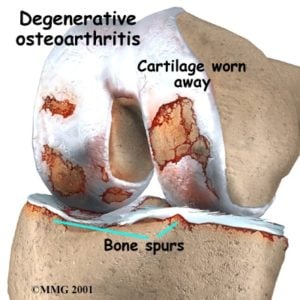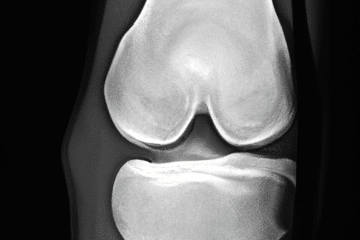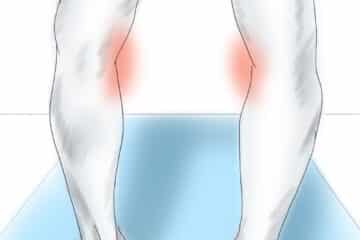
Considering knee replacement surgery is a tough decision to make. Prior to taking the leap, many will try all reasonable alternatives to knee surgery before scheduling. Knee replacement surgery is a very commonly performed procedure that involves the resurfacing of the bones of the knee with metal and plastic pieces or components. While there is a wealth of information and advertisements recommending which knee replacement to have, and where to have it done, there is very little published about knee replacement surgery alternatives.
The most common condition leading to a knee replacement is Osteoarthritis. Osteoarthritis affects nearly everyone over the age of 60, yet it can also affect those of us in our 30’s or 40’s if we have a genetic predisposition or if we had a previous injury.
Osteoarthritis, by definition means that the cartilage cushion on the ends of your bones is wearing away. While there is no cure for osteoarthritis, the are many alternatives to surgery available to treat the pain associated with osteoarthritis and thus postpone the need for a knee replacement.

Why postpone a knee replacement? Well, a knee replacement is a big procedure involving numerous risks and a significant recovery period. Some of the risks associated with a knee replacement include:
- Infections
- stiffness
- blood clots, heart attacks and death
- loosening of the pieces or components
- instability of loose feeling in the knee
- injuries to blood vessels or nerves
- risks of anesthesia
Now, if your pain doesn’t improve with physical therapy, a knee compression sleeve, and certain supplements, then, in the right setting and after the failure of non-surgical treatments a knee replacement might prove to be your best option. But you may have a few years left with your knee, and since a knee replacement only lasts so long, the longer you have your own knee, the better the chances are that you will only need one knee replacement in your lifetime.
Related post: Should I have a knee replacement?
Knee replacement surgery alternatives:
There are many well proven alternatives to knee replacement surgery. Some are simple, some are more complex or invasive.
There is a body of literature that supports the use of various supplements and vitamins to potentially slow the progress of arthritis and diminish the inflammation. Some of those which have been studied include
- Chondroitin Sulfate
- Vitamin D : Not useful alone
- Curcumin
- Omega fatty acids
- minimizing sugar intake can decrease total body inflammation
The anti-inflammatories also have a role if you are able to take them.
- Ibuprofen
- Naprosyn
- Celebrex
- Meloxicam and others.
These medications can interfere with other medications like Plavix and Coumadin, and they can cause ulcers and kidney disease so be sure to check with your family doctor first.
Braces or Compression Sleeves: Compression sleeves can be effective in treating the pain associated with arthritis too. Simple neoprene sleeves will significantly improve the pain in many patients. It probably works through a biofeedback neurological mechanism, so if it’s tight enough to stay on, it is the proper size. Do not get a brace that is too tight. In this post I review the compression sleeves I see most often. Other braces that need to be ordered through your doctor can “unload” or take the pressure off side of your knee and transfer the stress to the other side of the knee. Since arthritis tends to begin on one side of the knee these braces can be very effective too.
Physical activity and physical therapy can be effective as an alternative to knee replacement surgery. In general, arthritic joints like to move. Activities such as rowing, walking, swimming or riding a bike are better tolerated. The stronger the leg muscles are, the less discomfort you tend to have. For those who have access to a pool… pool based exercises can be very beneficial for arthritis sufferers. Arthritic knees actually like to move… they become very stiff and painful from inactivity. Do I need to remind of that severe pain and stiffness is in the morning? ;-(
Ice can help alleviate the pain after a day of activity. Compression ice wraps can be used 15 minutes on, 15 minutes off to minimize the risk of frostbite.
Warm compresses to stimulate bloodflow to the knee can help, particularly towards the end of the day, or even early in the morning to help loosen up the joint before the day begins. Warm compresses can be used a few times a day.
Weight loss: For every pound you weigh, you put four to seven times that amount of weight across the knee on each step. So if you weigh 300 pounds, your knee is subject to 1200 lbs of force with each and every step. Therefore, even a small amount of weight loss can lead to significant improvement in pain.
A cane… yes, a cane. Get over it :-) ! They work. Use the cane in the opposite hand. o if your right knee hurts, use the cane in your left hand.
Injections as an alternative to knee replacement surgery.
If you have tried oral medications, braces, and exercise – and yet you are still suffering, there are a number of injections available to significantly ease the pain you are suffering from.
There are many different types of medications or substances available for injection.
The workhorse of the injections is cortisone. This is a steroid and can not be injected too often, but it can make a warm, swollen, painful arthritic joint very comfortable in a very short period of time. There are risks associated with steroids, especially in diabetics where it will cause a rise in your blood sugars. While steroids are useful for acutely painful arthritic knees and people who are truly miserable, there are other injections you should consider either instead of, or after the steroid cools down your knee a bit.
Gel injections… or Viscosupplementaion involves the injection of Hyaluronic Acid (HA) into the knee joint. HA is a substance found in abundance in normal knees, and for some reason arthritic knees stop producing as much. These injections involve putting the Hyaluronic Acid back into your knee over a period of 3-5 weeks. This is generally a very well tolerated injection and can result in relief of your pain for anywhere from 4-12 months. No, it will not work on everyone… but most people respond very well. Many companies manufacture HA and the name brands include Synvisc, Orthovisc, Supartz and Eufflexa.
Platlet rich plasma, or PRP, which involves the injection of a portion of your own blood into your knee has been scientifically proven to reduce the pain from osteoarthritis for up to one year or more. In the end… PRP and stem cell injections may prove to be the best alternative to knee replacement surgery… but the jury is still out. One important caveat… Most insurance plans do not cover PRP injections. It truly is the wild west out there with regards to pricing and preparation. The research about PRP continues to the this day… we are still unsure of the exact reason why it works and the best way to prepare it… but the currently available methods seem to work well. I have called many offices in my area and found that the price for a PRP injection into a knee can vary from $1000-$5000 – so please shop around and do not be afraid to negotiate.
Please note… an arthroscopy, or scope should not be considered a viable alternative to a knee replacement. Having a surgeon go in and “clean things up” is not generally very effective.
Ultimately, you may go on to require a knee replacement. Keep in mind, it should be YOUR decision when that moment should arise. This is a quality of life procedure and only you can determine if you are ready, and if you have suffered enough. Luckily, there are knee replacement surgery alternatives that can work to improve your pain, improve your quality of life and potentially hold off a knee replacement for years.















I am not a patient of Dr luks…but I am a patient of a good orthopedic doctor in Tampa, Fl. I elected to go the brace route…I am wearing two offloading braces….I am so happy and totally pain free…even my night pain that was at one time was so bad is no longer there….Helen Yettaw
My right knee, too, is bone on bone. I was scheduled a couple of years ago for a total knee replacement and had to cancel because of family obligations that came up. Have been putting it off since. I am on my feet 5 to 6 hours a day working and 70 years old. Should I consider microfracture surgery before total replacement?
Probably not… but I can’t give a formal recommendation unless I see you in the office.
My mother is 96 years old and her knees are now totally bone on bone and it takes both my husband and I to get her up to even get to a bedside commode. Needless to say, I am not getting much sleep, as I have to sleep in her room and wake my husband to help every time she needs to get up. She can only lie down for a few minutes before she sits up with her legs on the floor, whimpering in pain. Her family physician says it is arthritis and bone on bone and that he does not think shots will help. He has just put her on pain patches and pain pills. My question is whether it would help the pain of getting up and back to bed and maybe even walking, if she had a knee brace? She does have a pacemaker, but other than that she is in good health and it is so sad that she must just sit on the side of the bed in her room for the rest of her life.
Hi Jeanie…
A compression sleeve might help a little. Not sure whether the “gel” shots would help her. It sounds aggressive but we have replaced the knees of 90+ year olds with good results. Sure the risks are higher… but it is a quality of life decision.
Hi there, thank you for your time to share your knowledge! I am 60, looking at bilateral tkr, I don’t have a lot of pain, but my knees are bone on bone and feel unstable or loose if you will. I get a klunking sensation through my entire body at times when I walk. Not clicking. Much stiffness. Would like to delay surgery but am I causing further damage by doing so?
the arthritis will continue to progress… but that’s not the reason to have surgery. This is a quality of life procedure. It is your decision as to when the surgery should take place. There are plenty of people walking around with bone on bone knee arthritis who do not need surgery. This is not an easy decision to make…
good Luck
Had meniscus surgery on right knee about7 yrs ago. Did fine for about 6 yrs. In last year discomfort going down and recently up stairs. Also increasing stiffness after sitting. Last week knee popped out whengetting off couch. Extreme pain but didnt fall. Dont usually have much pain and even after that was minimal pain in a few days. Saw ortho docto yesterday and said i was bone on bone and recommended TNR. Have big trip(long flight) coming up end of July this year and I am concerned wont be healed enough Thinking of waiting till i come back in sept. But i am also concerned this might get real bad before or during trip ???
A knee replacement is an elective surgery… and it is performed for issues relating to your quality of life. It is not the surgeon who determines when you need a knee replacement, it is you who determines when you need a knee replacement. Most patients wait until the pain in their knee is affecting their quality of life so much that they want to move forward with the surgery. Often times these “exacerbations” settle down after a few weeks. Many patients, even those with bone on bone arthritis will respond to wearing a compression sleeve and physical therapy to keep the leg strong.
Good luck to you !